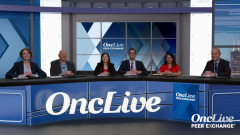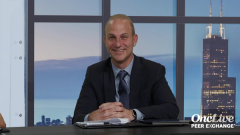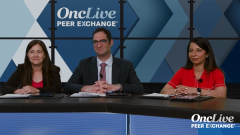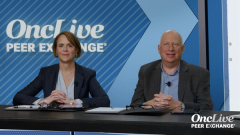
Adjuvant Osimertinib in Early-Stage NSCLC: The ADAURA Trial
Advances in Testing and Targeted Therapy for NSCLC: Translating Evidence to Clinical Practice
Episodes in this series

Transcript:
Benjamin Levy, MD:Let’s move away from chemotherapy and talk about more exciting targeted therapy, where we are seeing huge disease-free survival [DFS] advantages. Jonathan, can you give us an overview of the ADAURA [study; NCT02511106] data? It was practice-changing and it is the first targeted therapy approved in the adjuvant setting for lung cancer. There’s been a lot of work put into this, and it kind of hit the mark on every level,
Jonathan Wesley Riess, MD: The ADAURA trial with adjuvant osimertinib is one of the pivotal trials in EGFR-mutant non–small cell lung cancer. Based on the robust progression-free survival and overall survival [OS] benefit shown in the FLAURA study in the metastatic setting of osimertinib compared to earlier generation, first-generation EGFR TKI [tyrosine kinase inhibitors], this was bringing osimertinib to the adjuvant setting looking at stage IB to IIIA EGFR-mutant non–small cell lung cancer, the more common EGFR exon19 deletion and L858R mutations. Patients with surgically resectable stage IB to IIIA EGFR-mutant non–small cell lung cancer with those common mutations randomized to receive osimertinib vs observation osimertinib for 3 years. The primary end point was in stage II to IIIA patients by the AJCC 7th edition [The American Joint Committee on Cancer: the 7th edition, effective for cancer diagnosed on or after January 1, 2010] of lung cancer staging, and there it showed a robust disease-free survival benefit that was quite striking. We still don’t have overall survival data that’s mature but the trend was in the right direction and so I consider it a practice-changing study despite not having the overall survival benefit mature results yet- because of the magnitude of DFS benefit. I do offer it to my patients certainly for IB to IIIA EGFR-mutant non–small cell lung cancer, and also with a robust but not quite as good a hazard ratio as stage IB; being not as advanced that makes sense. It still looks quite good and I do offer it to those patients as well but with a more nuanced discussion.
Benjamin Levy, MD: I will speak for myself and say I was overwhelmed with that hazard ratio. I hope we see an overall survival advantage. It’s tough for me to believe we won’t. We have an early data cut for central nervous system [CNS] metastases and not surprisingly there were way more CNS metastases in the placebo arm than there were in the osimertinib arm. It’s hard for me to believe that that in and of itself won’t translate into some sort of OS, but as Heather mentioned, some of the other data from China and Japan shows the curves diverge. At least TKI vs chemotherapy, after the 2 or 3 years of TKI, those curves come together, so the question is the duration of osimertinib in the adjuvant setting. I’ll ask my third unfair question to Jonathan. You have a patient come to your office, stage IB tumor, it’s resected and has a EGFR exon19, doesn’t want chemotherapy, just wants the [osimertinib]. Are you OK just giving the [osimertinib]? We know those patients that didn’t get chemotherapy in the ADAURA trial did benefit. Are you comfortable doing that?
Jonathan Wesley Riess, MD: I have a discussion with the patient and I make it clear that adjuvant cisplatin-based chemotherapy, as of now, is the only treatment in the adjuvant setting that has an overall survival benefit. With a patient we are clear cut, no positive N1 stage II disease, stage III, I say there is no substitute for cisplatin- based chemotherapy. But even after having that discussion and emphasizing that, not every patient wants adjuvant cisplatin-based chemotherapy and in that situation, I would offer adjuvant osimertinib.
Benjamin Levy, MD: And 3 years of osimertinib? And then call it a day?
Jonathan Wesley Riess, MD: For now, yeah. I would follow data—until there are updates, I would follow the trial data. I think this is going to be an evolving set of research questions that we’ll spend years sorting out, things like duration, the role of circulating tumor DNA, and looking at MRD [minimal residual disease]. That’s all going to take years to sort out, but for now, I’ll follow the trial data.
Benjamin Levy, MD: Any other comments on the ADAURA?
Alexander Spira, MD: I wish we’d have 1 year, 3 years is a long time. Osimertinib is a well-tolerated drug, but by year 2, it’s not easy. There are real adverse effects, and there’s a cost to society, right? This is $150,000, if not more, per year and it should be taken into account. Maybe it should be lifelong. People argue this all the time. It’s the amivantamab story for adjuvant GIST [gastrointestinal tumors]. Are you just kicking the can down the road and what should it be?
Transcript edited for clarity.








































